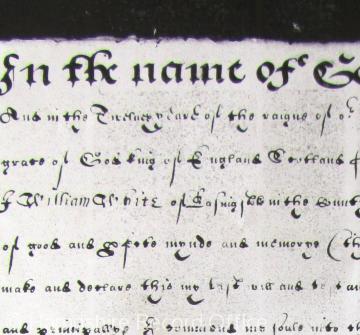Basingstoke Probate Material 1601-10

Basingstoke was the most important centre of cloth production in 16th and 17th century Hampshire, with a peak of activity in the early 16th century. Despite economic difficulties, the industry remained important in the early 17th century as is apparent in nine of the wills and inventories below. The cloth was woven in the town or in the surrounding rural areas. It was then fulled manually in the town, or increasingly in water-powered fulling mills in the countryside. There was probably a succession of new families arriving in Basingstoke, but also a number of families who lived in the town from generation to generation. Some of these longstanding families had accumulated land and were taxed on land rather than on goods, for example in the Lay Subsidy of 1586. Records of the subsidy collected for the Basingstoke area in 1603 also survive in the Jervoise of Herriard records in Hampshire Record Office..
Basingstoke parish remained mainly agricultural in this period with over 3000 acres of open field land to the west and south of the town. Some wills of yeomen survive below.
Many testators bequeathed money to the local church and/or to the poor. They thus illustrate the importance of private charity alongside the parish relief provided by the Elizabethan Poor Relief Act of 1601.
For this decade probate documents survive in Hampshire Record Office (HRO) for 28 individuals, of these 19 are transcribed for this section. The National Archives on-line (PROB 11) has 12 wills for Basingstoke individuals for this decade, all of which are transcribed below.
These transcriptions have been made from copies of original probate documents supplied by HRO and TNA. Words have been modernized and punctuation added to make reading easier but names have been transcribed as written. Words in italics indicate omissions in the original document which have been added to make sense of the text. Words in square brackets indicate that they have been transcribed as seen but where the meaning is unclear. Basingstoke is described as being in the county of Southampton, the old name for Hampshire.
A glossary is attached of unusual words.
- Richard Hall, junior, yeoman, 1601 (Will and inventory)
- Richard Deane, gentleman, 1601 (Will)
- Leonard Boone, 1601 (Will)
- Wadlow Rumbold, innkeeper, 1602 (Will)
- William Blunden, yeoman, 1602 (Inventory)
- Justinian Stockar, 1603 (Will)
- Robert Manfield, senior, yeoman, 1604 (Will and inventory)
- Richard Exall, shoemaker, 1604 (Will and inventory)
- William Stocker, yeoman, 1604 (Will and inventory)
- Avis Austin, widow, 1604 (Inventory)
- Henry Rich, clothier, 1604 (Will)
- Richard Hall, clothier, 1605 (Will)
- Thomas Normanton, yeoman, 1605 (Will and inventory)
- Walter Bernard, 1606 (Will and inventory)
- Edmund Eales, yeoman, 1606 (Will and inventory)
- Arthur Baffe, woollen draper, 1606 (Will and inventory)
- James Smithe, clothier, 1606 (Will)
- Edmund Cunliffe, gentleman, 1606 (Will)
- Alice Goringe, widow, 1606 (Will)
- Thomas Barnard, yeoman, 1607 (Will)
- Harrye Ockley, dyer, 1607 (Will and inventory)
- Robert Stocker, yeoman, 1607 (Will)
- William Wigg, yeoman, 1607 (Will)
- Henry Hinklow, currier, 1608 (Inventory)
- James Martin, clothier, 1608 (Inventory)
- William Purchase, dyer, 1608 (Inventory)
- William Purchase/Purchis, dyer 1611, 1614 (Sentences/Judgements relating to will and inventory of 1608)
- William Payne, blacksmith, 1608 (Inventory)
- John Seagrave, 1608 (Inventory)
- Sir James Deane, merchant adventurer, London, 1608 (Will)
- Thomas Fashen, senior, glover, 1609 (Will and inventory)
- William Hawkins, clothier/shearman, 1609 (Will and inventory)
- Raphe Philips, woollen draper, 1609 (Will)
- Edward Austin, baker, 1610 (Will and inventory)

